Stone is such a huge part of a good garden. It is one of the main elements that can be used for structure and permanence but so often I see it used in a rather uncreative way. On a practical level, it is true that to make a garden feel right in it’s place, stone that is indigenous to the region will best do the job. When I lived in England, the buttery tones of Cotswold stone were very popular as were the more grey casts of the Yorkshire stone, but here in New England, it is granite and bluestone that looks better in the landscape and the light just like the colorful sandstones often look best in places like Colorado. I suspect that many of my cohorts will talk more about using native stone in the garden and how to use them, so I thought I would take a little different approach and seek to inspire you with a few virtual visits to interesting rock gardens who feature stone in ways that aren’t so common.
1) The Walker Rock Garden
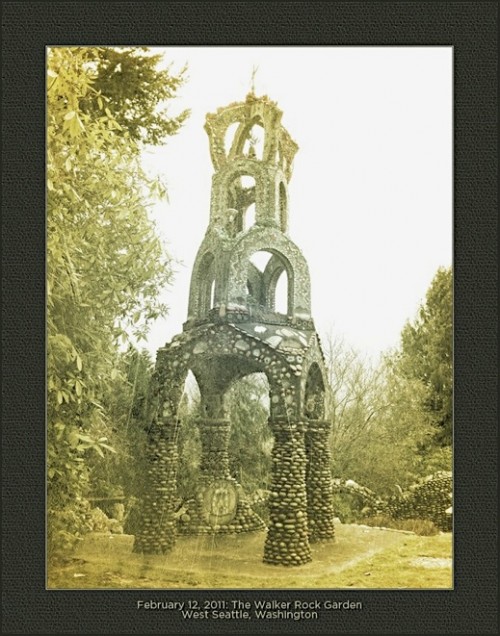
To look at this fantastic image (above) by photographer David Perry, you might think this garden is some sort of ancient ruin located in some tourist laden place. But, in fact it is not. This is located in the backyard of a West Seattle home and is the fantastical creation of its owners, two people who clearly know what they like and have the heart and passion to create it.
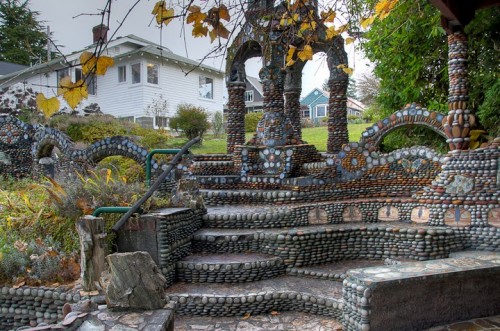
You can explore more images of this garden at David Perry’s site, where the garden feels like it emerges from another time and place or for an equally interesting photographic take, Check out Brad Coopers Picasa album which shares the garden in a way that highlights the context of the garden and it’s rather unexpected suburban location.
2) Nek Chand’s Rock Garden (Chandigarh, India)

Nek Chand also had a vision and spent 18 years creating it under the cover of darkness. Because the garden was prohibited by local building regulations, he secretly cleared an area of the jungle near his home and at night he scavenged discarded urban debris and transported hand-picked stones from nearby hills on his bicycle, in order to construct the characters that inhabit his realized dream of a kingdom of gods and goddesses.
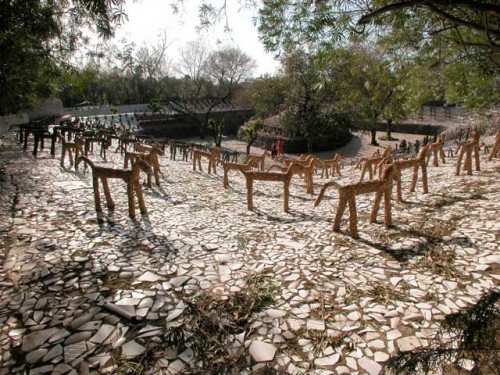
3) Dr. Sun Yat Sen’s Chinese Garden (Vancouver, BC Canada)
From the Sun Yat Sen Website: “The design of the Dr. Sun Yat-Sen Garden is based on the harmony of four main elements: rock, water, plants, and architecture… Together, these four elements combine to create a breathtaking experience of perfect balance, yin and yang. The stones in this garden were imported from Lake Tai near Suzhou China…. The Tai Hu rocks are thought to evoke supernatural powers and entice lucky spirits into a scholar’s garden. The beauty of these weathered rocks culminates in the precarious false mountain at the center of the Garden, creating the illusion of natural landscape from a man-made feat of engineering.”
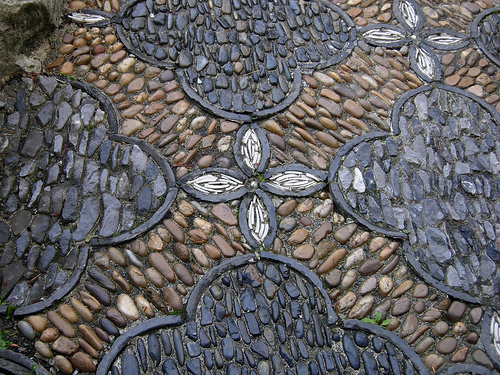
A visit to this garden’s website gives a stunning image of this peaceful place. It is a true Chinese garden in the Ming tradition, providing a place for entertaining, strolling, and contemplation in an environment that emulates nature.
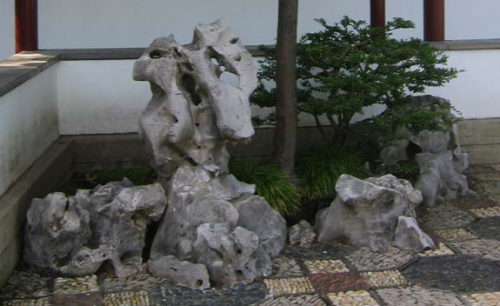
4) Dumbarton Oaks, Washington D.C.
Dumbarton Oaks is is a classic American garden designed by Beatrix Ferrand.
Here stone is used as mosaic elements to create beautiful decorative pieces in the style of gardens built in the 1920’s. The whole things is really a monument to the taste and artistic flair of the time.
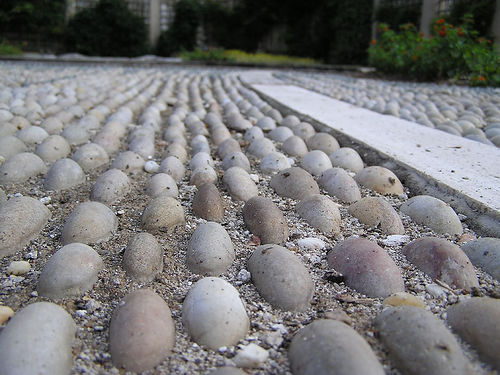
5) Kōmyō-ji Temple Karesansui Garden (Japan)
Japanese gardens – while often universally referred to as “zen” actually come in many different varieties. Karensanui is the name for the dry rock garden that is familiarly thought of when discussing Japanese style gardens.
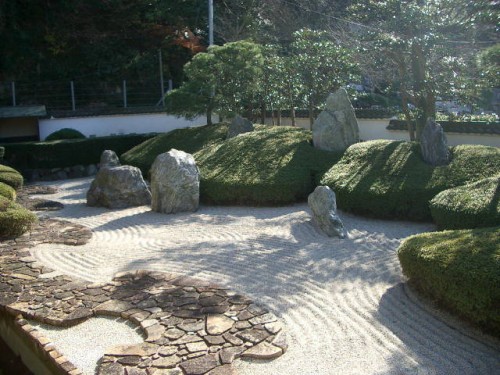
Tadahiro Kondo, who is a noted writer on Japan, says this about Japanese rock gardens: “In order to comprehend the beauty of a Japanese garden, it is necessary to understand — or at least to learn to understand — the beauty of stones. Not of stones quarried by the hand of man, but of stones shaped by nature only. Until you can feel, and keenly feel, that stones have character, that stones have tones and values, the whole artistic meaning of a Japanese garden cannot be revealed to you. Not only is every stone chosen with a view to its particular expressiveness of form, but every stone in the garden or about the premises has its separate and individual name, indicating its purpose or its decorative duty.”
In the Kōmyō-ji Temple the 8 stones in the Karensansui garden represent gods, priests and saints that are special to the temple. Each rock was carefully selected for each representation and positioned in the garden in a way to be more reverent and visually pleasing.
What inspiration do you take from these places? For me, when planning a new patio or stone wall, I think perhaps I should try to take my thinking a bit further, beyond the question of stone vs concrete pavers, dry laid or mortared, bluestone vs. granite….. to imagine how the stone that is native to my region can be the basis for something else even more extraordinary.
images from David Perry, Brad Cooper, mosaic art, nek chand, Manny Hernandez, elvisthefish
Make sure to take a moment and visit the other Roundtable Members and see what they have to say about Stone.
Deborah Silver : Dirt Simple : Detroit, MI
Sunny Wieler : Stone Art Blog : West Cork, Ireland
Douglas Owens-Pike : Energyscapes : Minneapolis, MN
Ivette Soler : The Germinatrix : Los Angeles, CA
Jenny Peterson : J Petersen Garden Design : Austin TX
Susan Cohan : Miss Rumphius’ Rules : Chatham, NJ
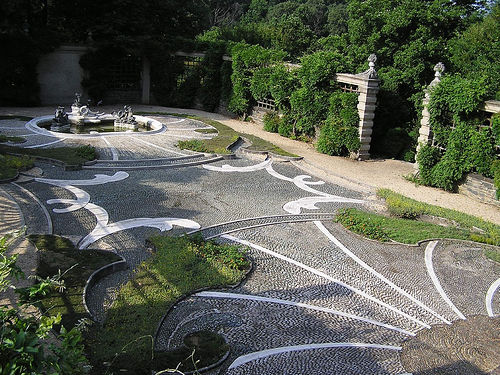
Inspiring. While I appreciate the nod some of the other designers are giving to the importance of relying on regional resources, your mini-world tour has kicked me into high-creative gear this morning.
What a wonderful trip around the world! I think my favorite is Dumbarton Oaks, it’s dynamic and soothing at the same time.
These are passionate creations by people with vision. I particularly like the Nek Chand’s Rock Garden – so surreal. It is fun to see stone used so whimsically.
Love those Japanese gardens! That smooth, rounded river rock is my favorite. Gorgeous examples of creative rock use.
The first one especially reminds me of Causland Park in Anacortes, WA. It is maybe not quite so fancy, but it’s still a lovely little park. It was built as a WWI memorial park and is full of hand-laid mosaic rock walls and structures:
http://www.trailergypsies.com/_images/Causland-Park-pan.jpg
http://farm6.static.flickr.com/5085/5380001220_3940f21ae8_z.jpg
http://farm6.static.flickr.com/5004/5379395083_f1cd375270_z.jpg
A truly inspiring global perspective on stone and off the wall thought as to its use!
Thanks so much
best
R
Fantastic. The carpet at Dumbarton Oaks blew my mind when I first saw it. Amazing use of stone…way more patience than I have to create it!
Thank you for a peek into these passionate gardens! It’s so nice to take a break from the day to spend some time in these fantastic spaces.
I love the quote from Tadahiro Kondo, and it rings true with each of the gardens you have pictured, Japanese or not. The time and thought spent to create each garden is seen in even the smallest stone’s placement. An inspirational post, thanks for the tour!
Oh Rochelle what a GORGEOUS post! I am now dreaming of visiting distant lands just to look at the cool stonework!
Nek Chand’s rock garden – AMAZING!!! I DIE!!!
Rochelle, what beautiful examples of stone. I am completely inspired, especially because so many of these touches are small enough to be do-able in any budget.